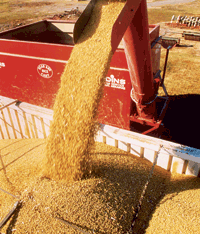Feedwatch: Buying opportunities on the way this summer

Although soyabean meal prices remain high, with spot prices at the time of writing in the late £280/t and supplies into the UK being closely matched to demand, the reality is prices for the summer are already a lot lower. The main reason is the positive news coming out of South America, with June to October contracts trading at about £230/t, a £40-50/t discount to April.
The latest USDA report shows the Brazilian harvest estimate up 1m tonnes to 66m tonnes (compared with 57m tonnes in 2009), with the harvest already ahead of last year due to good conditions. And although Argentinean harvest predictions remain unchanged at 53m tonnes, it still represents a big increase over last year’s drought-affected crop of just 32m tonnes.
At present, the total South American soyabean harvest is still on track to hit 119m tonnes, some 30m tonnes higher than last season and 12m tonnes more than the biggest ever harvest of 107m tonnes, achieved two years ago.
In addition, global stocks have risen over the past year to just over three months, from lows of about six weeks. The last time stocks were at these levels, in late 2008, soyabean meal prices in the UK were down to £200/t.
It means as long as the South American crop continues to match predictions as harvest proceeds, there is every possibility soyabean meal prices for the summer could fall further. A word of caution, however, relates to the potential for the Argentinean government to, once again, use export tariffs to keep much-needed crop in the country, a move that last year resulted in farmers blockading the ports.
More concerning is the potential for supplies to temporarily tighten further in the short-term. Shippers are understandably nervous at the prospect of being left with stores full of soyabean meal bought at the peak of the market when the price finally does drop, so they’re keeping UK stocks to a minimum. Make sure you have plans in place to cover immediate needs, aiming to book cover for at least 50% of summer requirements as prices ease further.
Compounding the problem are low supplies of other protein feeds. Little wheat distillers’ feed is available, and tight rapemeal supplies through till April have pushed the price to near £200/t. There is, however, some maize gluten coming into the south west for those specifically looking for a well-priced mid-protein feed.
Looking forward, spring turnout will inevitably see the availability of both rapemeal and wheat distillers’ feeds improve. The resulting fall in rapemeal prices will make the heat-treated rapemeal ProtoTec a viable option for those looking to minimise soyabean meal requirements through the summer and cut overall protein costs.
In addition, any move down in soyabean meal prices will be reflected in the cost of all these mid-protein feeds, so expect some good opportunities to secure summer requirements over the next couple of months. This year will also see the return to UK markets of imported maize distillers’ feed and possibly US maize gluten.
For energy feeds, there are still huge stocks of cereals in the UK at present, with little export activity, plenty of futures trading but few farmers actually selling. The question now is how long farmers can afford to hold on to crops as they wait for prices to rise, particularly with fertiliser bills to pay in the near future.
Wheat prices are hovering in the mid £90/t at the time of writing, with currency fluctuations and export volumes likely to be the biggest influences on old crop prices. Unfortunately, events in Greece look set to keep the Euro weak against Sterling, making it hard for the UK to compete for export orders against the likes of Russia and Ukraine.
For the livestock farmer, it means energy feed prices are still more likely to fall than rise. There is more good news in the form of improved supplies of maize meal and processed bread, with crackerfeed a good buy where available at about £105/t and fibres sources, such as sugar beet feed and soya hulls, still competitively priced.
Looking forward, wheatfeed prices for the summer have already dropped to £60-70/t, and are certainly worth considering at this level. But for most energy feeds, it is a case of watch and wait – as those cereal stocks inevitably hit the market between now and June, there are likely to be opportunities to pick up good value forward contracts for the summer and even into next winter.
